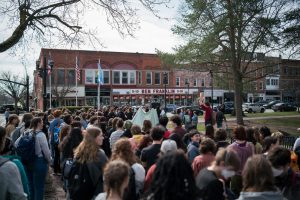Fate of Johnson House Barn Remains Unclear
September 13, 2013
The future of the Johnson House Carriage Barn, the wooden structure behind Johnson House and next to the Arboretum, remains in limbo. The current discussion over the barn was prompted by the plans to demolish it.
“The College has been in conversation with several groups regarding the issue of financing for the stabilization, and/or use of that particular structure,” wrote Assistant to the President Tita Reed in an email to the Review. “These conversations have not resulted in new developments. College administration recognizes the public support to rehabilitate this structure but as we move forward, it is important to balance this objective with practical measures.”
Steve McQuillin, OC ’75, has been a vocal supporter of renovating the structure; last spring, he pushed for a variety of new uses for the structure, including a dorm, housing for visiting alumni or a meeting facility. McQuillin has contacted the College about applying for state preservation money to fund the project, but has not received a response. With the Sept. 30 application deadline looming, it now seems to be an unlikely source of funding.
“We all thought it was going to be torn down this summer and that was the indication that other people had gotten about it too, So the fact that it’s still standing is good,” said McQuillin in a phone interview.
The barn was built in 1885 for Albert H. Johnson, a wealthy resident of the area. According to McQuillin, this is not the first time the Johnson property has been threatened. About 30 years ago the College was planning to tear down Johnson House, which resulted in the placement of the Johnson House and Barn on the National Register of Historic Places in order to protect the structures. Ten years ago plans were proposed to rebuild the barn from the existing stone foundation and make a new dorm from the resulting building, but the project was scrapped when the city did not rezone the property.
“It’s not that crucial that something be done immediately,” said McQuillin. “It was the College that was saying ‘Well, it’s a hazard. We’re going to tear it down. I think you can sit there for a while while decisions are made. I just hope there’s not a decision to tear it down right away without letting anyone know.”

























